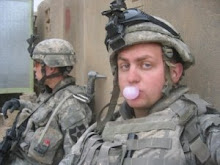The high-pitched squeal of the Stryker engines stretched along the dusty back road on the edge of the Diyala River Valley. One by one, the ramps dropped to reveal squads of infantrymen under the strain of heavy equipment needed in counterinsurgency operations: shotguns, bolt cutters, pry bars and shoulder fired rockets. Food and water are transformed into luxuries as assault packs were stuffed with extra ammunition magazines and grenades instead of bottles of water and meal rations. The beleaguered soldiers filtered into the palm groves one by one, gaining a foothold before an all-out clearing mission began to destroy pockets of resistance. Assaults into enemy-held territory in the heart of Baqubah yielded numerous caches and dead insurgents, cut to ribbons by rifle and machine gun fire in the beginning days of the Battle of Baqubah. Intelligence suggested that more caches and insurgent bases were hidden in the dense and humid date palm groves that engulfed the banks of the Diyala River Valley. As I stepped off the road and into the jungle, the hum from the Stryker engines became more distant and muted as I made my way through the bush. Twenty yards in, the Strykers could not be heard at all. Our evacuation, our makeshift homes, our lifeblood - cut off by thick foliage. The wind pierced the canopies of the trees, rustling fiercely in the afternoon sun.

I only had room in my assault pack for two bottles of water. The third sat in my open cargo pocket, sploshing quietly with each lunge over the slippery irrigation ditches etched deep into the ground. The sun hung low in the cloudless March sky, pounding the earth with its merciless rays. The mission was to last from early morning to sunset, so I had to be careful and ration the three liters of water throughout the day. The water bottle in my cargo pocket was accessible but awfully warm. After every security halt I put the bottle to my lips, the torrid water bringing little relief to my quickly overheating body. Despite the revolting taste of near boiling water, I finished my last drop halfway through the day. My dry throat ached for relief as my body sweat out liquids that had no replacement. Dehydration was quickly becoming a threat.
Over the crest of a hill brought heavenly solace. Lush orange trees towered above the afternoon patrol. Low hanging oranges and grapefruits were ripe for the picking as we walked along the occasional dirt path. I filled my cargo pockets with oranges, peeling them as we continued our push into the valley. On a security halt, I gingerly bit into a slice, sending cool, bitter juice into my throat. They didn't taste much like the sweet and crisp Florida oranges found in a grocery store. They were sharp and tart, the juice reminiscent of a dry Chianti rather than Tropicana. The fruit was too sour to eat whole, so I sucked out the juice and flung the leftovers into the tall grass. As the orange trees became less frequent, I stocked up on the last few ripe specimens as we marched slowly to the river.

Some good ones fell into the muck
**
Combat is a difficult thing to get across in conversation far removed from the battlefield. The hardest part is relating what it feels like, smells like, sounds like to be in a war zone for fifteen months or longer. The gap of understanding between civilians and veterans is a hard one to overcome without an insight into what exactly those in the military are perceiving when they are off in a faraway land. I hope these small vignettes provided, at the very least, a glimpse into what young men and women are experiencing in Iraq and Afghanistan as you read these words. A combat deployment is, among other things, an assault on the senses that carry on long after a soldier returns home. As the years pass, it will be the sights, the sounds and the smells of war that remain most vividly in the memories of those who have taken that long journey to Hell and back again.







12 comments:
That was a post worthy of a BlackFive cut n' paste.
Dad
Nice job on the series. It was bringing back memories. Especially about heat rashes and the zombie-like state we were in when we had sleep taken from us.
Hope you dethrone Michael Yon.
That was a great series. Thank You.
marian
That was neat. It did bring it to life. I am sure each of those trigger senses will stay with you for a long time too. I know I will think of each one for a while. That's how alive you made them for me. Thanks for sharing it.
Once again, a return to Maslow's heirarchy of needs:
"The lower four layers of the pyramid are what Maslow called "deficiency needs" or "D-needs". With the exception of the lowest needs, physiological ones, (which do show physical symptoms when not met!) if the deficiency needs are not met, the body gives no indication of it physically, but the individual feels anxious and tense. These deficiency needs are: physiological, safety and security, love and belonging, and esteem." The physiological needs are breathing, food, water, sleep, sex, homeostasis and excretion.
Of course, from what I read most soldiers are definitely not having all their "D-needs" met, if they can't even get enough food, water or sleep! And yet people don't understand why soldiers come home with all manner of physical repercussions and varying degrees of PTSD. How could they not??
This series on the five senses gave us all just a small glimpse into your experiences in Iraq. Your stories are the beginning of a bridge over that gap of understanding between civilians and veterans. Without that bridge, we would never be able to reach each other!
Thank you Alex for taking the time to teach us.
This series was powerful and well-written. Your words and photos took me right there with you, as far as it is possible to do so. I'm in Baghdad now, and have flown over those date palm plantations, but that's a different thing than walking through them looking for trouble. Iraq is different now. It's much quieter, although still violent in places and at times. You'd be bored now. Which is really a good thing. And if you had not done your job, it wouldn't be quiet now. Many thanks.
- Skip
I still cannot get over that you used your cargo pockets. I would get rubbed red in half a mile.
Drink water!
Dude, incredible work you are doing! In a single night, I've devoured every post in your blog like an MRE after a week of nothing! Thank you... ... ...
Great series, thank you.
I am devouring anything I can from ya'll who have returned home and continue to write...a friend of mine *just* came home from Iraq & we're negociating that territory right now . . .
The high-pitched squeal of the Stryker engines stretched along the dusty back road on the edge of the Diyala River Valley.
Just stumbled upon your blog. That opening sentence is superb. I've read college creative writing graduates work, and they haven't been able to come close to that first sentence. And as we say in writing ...if you don't have a killer first sentence, you don't have a chance. Congrats on your finish.
Fabulous writer. I'll link ya on my blog.
"...reminiscent of a dry Chianti..." talk about poetic license!
But seriously; your voice rings true and your talents as a writer/photographer are top notch. You've realized, perhaps unconsciously, that pictures in and of themselves are stories.
Life gets increasingly complicated as we grow from our teens to adutlhood. I sure hope we don't lose you to the rat race!
dude. you nailed it.
bravo zulu troop.
i once told a guy on a hump with me who asked for a piss break
if you got any piss left i'm not driving the pace hard enough. three minutes, then back out at the trot.
we weren't very concerned with hydration.
Post a Comment